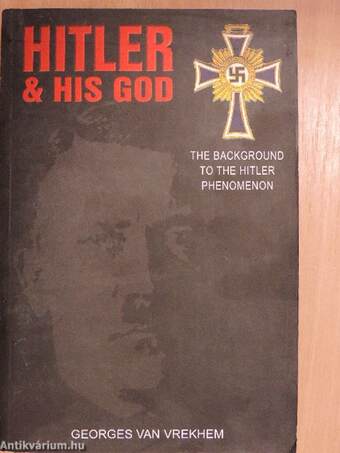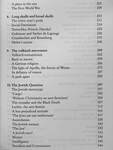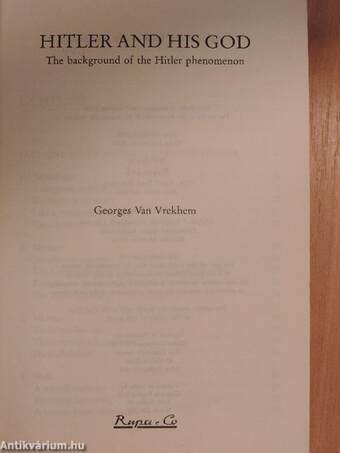1.062.389
kiadvánnyal nyújtjuk Magyarország legnagyobb antikvár könyv-kínálatát

VISSZA
A TETEJÉRE
JAVASLATOKÉszre-
vételek
Hitler and his God
The background of the Hitler phenomenon
| Kiadó: | Rupa&Co |
|---|---|
| Kiadás helye: | Delhi |
| Kiadás éve: | |
| Kötés típusa: | Ragasztott papírkötés |
| Oldalszám: | 700 oldal |
| Sorozatcím: | |
| Kötetszám: | |
| Nyelv: | Angol |
| Méret: | 23 cm x 15 cm |
| ISBN: | 81-291-0953-0 |
naponta értesítjük a beérkező friss
kiadványokról
naponta értesítjük a beérkező friss
kiadványokról
Fülszöveg
Hitler remains an enigma in spite of everything that has been written about him.
Historians like Alan Bullock, Ian Kershaw and HR Trevor-Roper confess their perplexity
openly. How was it possible that an unknown, solitary and futureless front-soldier in
1918 became, some years later, the Leader and Messiah of the German people? How
could a nullity unleash the most destructive and deadliest war humanity has ever known?
Academic historians give countless reasons because the essential reason keeps
escaping them; fantasy writers find the most bizarre occult explanations, disregarding
the historical facts.
Georges Van Vrekhem has studied the literature in German, English, French, Dutch
and Italian for several years. His conclusion is clear: in Hitler there must have been a
cause equivalent to the effects of his actions. Van Vrekhem gives a revealing picture of
the rise of the unknown Austrian corporal and brings to life the people who helped him
in the saddle: Dietrich... Tovább
Fülszöveg
Hitler remains an enigma in spite of everything that has been written about him.
Historians like Alan Bullock, Ian Kershaw and HR Trevor-Roper confess their perplexity
openly. How was it possible that an unknown, solitary and futureless front-soldier in
1918 became, some years later, the Leader and Messiah of the German people? How
could a nullity unleash the most destructive and deadliest war humanity has ever known?
Academic historians give countless reasons because the essential reason keeps
escaping them; fantasy writers find the most bizarre occult explanations, disregarding
the historical facts.
Georges Van Vrekhem has studied the literature in German, English, French, Dutch
and Italian for several years. His conclusion is clear: in Hitler there must have been a
cause equivalent to the effects of his actions. Van Vrekhem gives a revealing picture of
the rise of the unknown Austrian corporal and brings to life the people who helped him
in the saddle: Dietrich Eckart, Captain Mayr, General von Móhl, and many others. The
author analyses Mein Kampf, the book in which Hitler laid bare his thoughts and
intentions without being believed. And he shows how this "man from nowhere", driven
by the obsession of his mission and helped by incredible luck, managed to become the
Führer.
To explain the foundations of a people who made Hitler possible, Van Vrekhem
undertakes, in the book's second part, a deep-probing analysis of the historical
background. In this he gives a surprisingly clear picture of the German ambition, the
racism which supported it, and the romantic youth movements which incorporated the
racism. In a memorable chapter he sketches the history of the German Jews. And he
shows another side of the German people: their longing for a better world, although
vitiated by their sense of superiority.
All this brings Georges Van Vrekhem to his central theme: Hitler's possession by
the "god" who inspired him, guided him, brought him to power - and dropped him when
no longer needed. This leads the author, in the third part of the book, to the unexpected
but well-documented role of the Indian philosopher and sage Sri Aurobindo in the action
against Hitler before and during the Second World War. While Hitler wanted to bring
humanity back to a state of barbarism, Sri Aurobindo stood for the progress of humanity
and a future in which a new evolutionary being, beyond humanity, might at last create
the world humanity has never ceased to long for. In this view of history, many worlds
interact and all facts fit into the big picture. Vissza
Témakörök
- Történelem > Társadalomelmélet
- Idegennyelv > Idegennyelvű könyvek > Angol > Történelem > Európa története > Egyéb
- Történelem > Idegennyelvű > Angol
- Történelem > Legújabb kor > Egyéb
- Történelem > Kontinensek szerint > Európa, európai országok története > Nyugat-Európa > Németország
- Történelem > Legújabb kor > II. világháború > Egyéb
- Történelem > Politika > Pártok, szervezetek
- Történelem > Politika > Ideológiák > Fasizmus
Georges Van Vrekhem
Georges Van Vrekhem műveinek az Antikvarium.hu-n kapható vagy előjegyezhető listáját itt tekintheti meg: Georges Van Vrekhem könyvek, művekMegvásárolható példányok
Nincs megvásárolható példány
A könyv összes megrendelhető példánya elfogyott. Ha kívánja, előjegyezheti a könyvet, és amint a könyv egy újabb példánya elérhető lesz, értesítjük.












